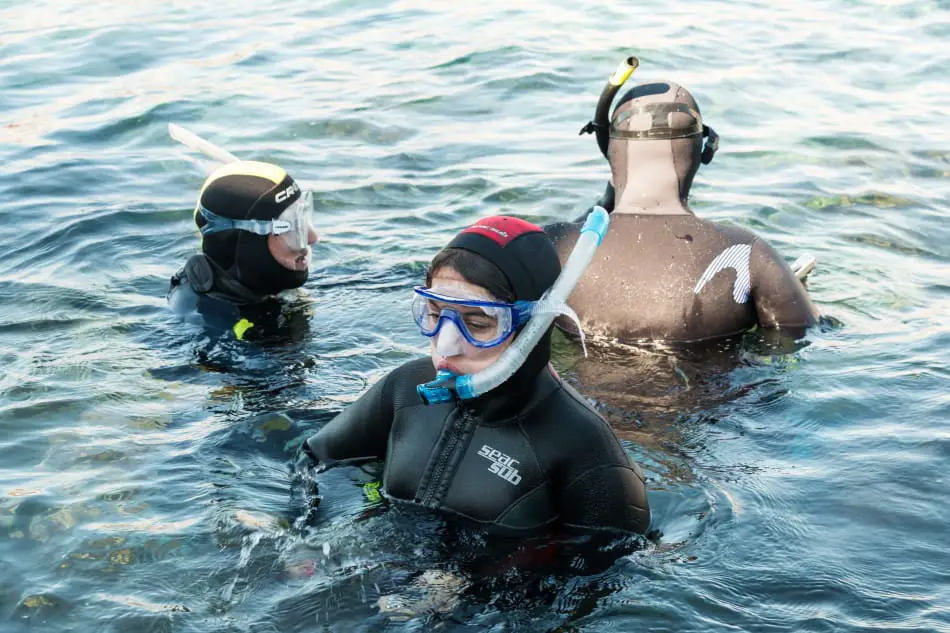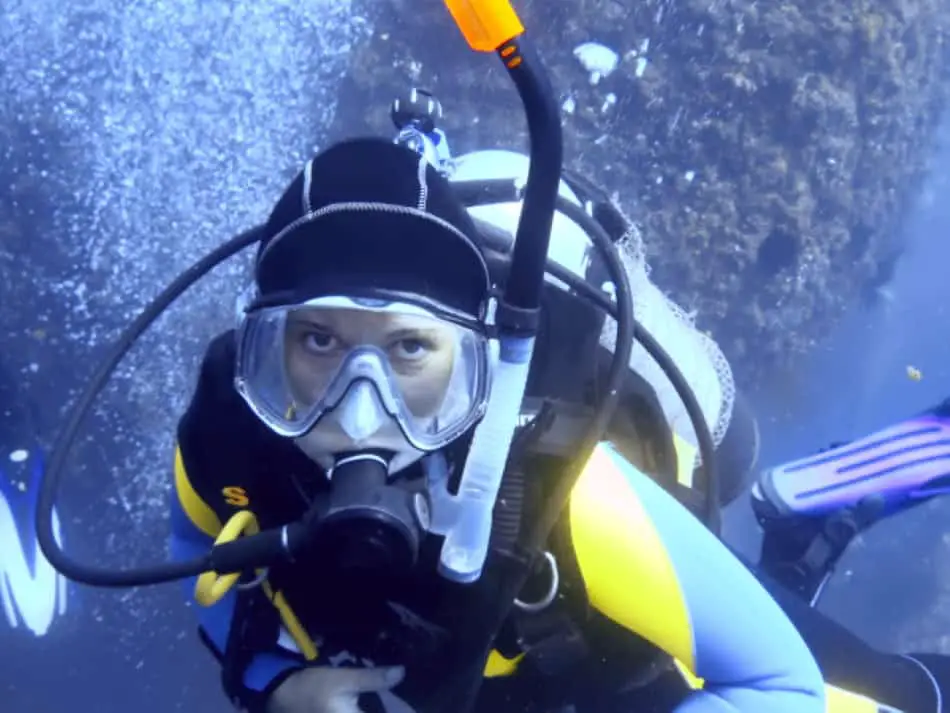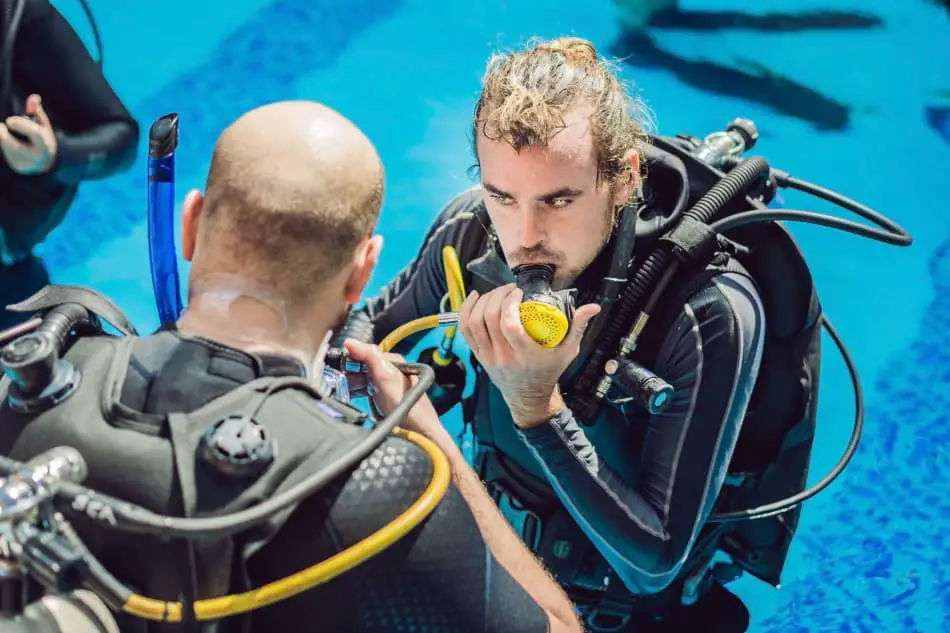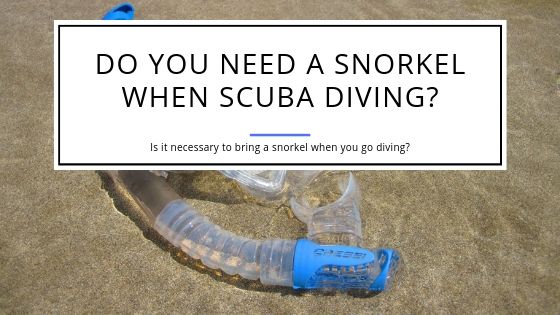Do You Need a Snorkel When Scuba Diving?
Scuba gear such as a tank, dive suit and dive computer is essential when you’re going for a dive. But the question remains, is a snorkel required for scuba diving?
Can You Scuba Dive Without a Snorkel?
Snorkels are definitely not needed for technical and commercial diving, but there is some debate about their use during recreational diving. Let’s go into a bit more detail and see why some divers believe that snorkels should be a part of their scuba gear while others are completely against the idea.
Why Would You Want a Snorkel When You Dive?
What exactly are the benefits of using a snorkel during your dive? You already have your scuba mask and tank to be able to breathe underwater, but there can be some advantages of having a snorkel with you.
Breathing While Swimming on the Surface After/Before a Dive
A snorkel helps you conserve air in your tank when you’re swimming on the surface before or after your dive – tips on how to reduce air consumption scuba diving. As you swim, you can also see where you’re headed underwater without having to constantly come up to breathe. It is especially useful if you’re swimming for a long distance before you begin your descent.
Although the air supply you’ll use up from your tank on the surface is usually minimal, it can be quite significant if there’s a high tide and the waters are rough. In such situations, your snorkel really comes in handy.
Warning
A snorkel isn’t always useful at the surface. For a short swim, a snorkel actually increases your carbon dioxide intake and it’s better to just swim without one. Similarly, if the waves are rough, it is better to descend earlier than planned since this will actually help you conserve energy.
If you’re waiting for your boat and breathing your snorkel, the unwelcome smoke from the boat will start seeping in through your snorkel. The dive regulator helps you avoid this problem. The wait is generally not significant, but if you’re with a large group of people, you may be exposed to the boat’s fumes for quite some time.

When Shore Diving to Avoid Air Being Used to Swim out to Where You Can Dive
If you’re swimming from the shore to your dive point and not going by boat, a snorkel can be particularly useful. You’ll have to swim a significant distance before you’re ready to begin you descent which means you’ll save a considerable amount of air in your tank – How Long can you stay underwater with a Scuba Tank?
Check Your Environment Just After You Jump into the Water While Not Diving
As you swim to your dive point, you can put your head in the water (without having to come up constantly to breathe) and gauge where you are, where the corals appear to be the thickest and brightest and choose where to descend accordingly.
Can You Use a Snorkel to Get Back to the Surface If You Run Out of Air?
You cannot rely on your snorkel to breathe underwater, but if you do make an emergency ascent and your tank has run out of air, you can rely on the snorkel to help you breathe as you swim back to your boat or to the shore. The snorkel will help you calm down and regulate your breathing at the surface.
What Are Common Reasons Not to Have a Snorkel When Scuba Diving?
Although snorkels help you conserve air at the surface, there are a number of reasons why divers avoid carrying one on their dive.
Drag and Pull from the Snorkel Underwater
Strong water currents will tug at the mask which will in turn pull at your scuba mask strap. This can either cause minor leaks in your mask or flood it entirely. Even if the mask doesn’t move, the snorkel will keep moving around and bumping everywhere which can be quite annoying.
It is important to note that this may not the case with every snorkel design. Some snorkels have a sleek design that doesn’t move around much in the water. Even slightly tilting your head to the side can reduce the drag caused by the snorkel.
Beginners May Confuse the Mouthpiece with the Regulator
In some cases, snorkels can be more of a nuisance and their benefits may be greatly outweighed by their cons. It is easy for beginners to mistake the snorkel for their dive regulator and breathe through the wrong piece when they initially get in the water. Being hit by a salty wave underwater can not only be annoying, but it can also be dangerous if the diver chokes in the water and is unable to breathe. However, this is a rare occurrence and divers generally don’t make such a mistake.
Scuba Diving Regulator Buying Guide – What you need to know!

It Can Get Caught when Diving in Small Spaces like Wrecks
Having a foot-long piece of plastic attached to the side of your mask is an open invitation for it to get stuck anywhere. Your snorkel can get stuck in a reel line or the hose of your BCD. In fact, dive instructors advise students to not wear a snorkel if they’re going cave diving or exploring shipwrecks underwater.
Although there are many components of a scuba divers gear such as their hose, fins or tank valve that can come in the way or get stuck, the aim is to minimize the number of loose items when you’re underwater. If you’re a professional diver who has been diving for a long time and is extremely comfortable in the water, a snorkel won’t bother you.
It Can Get in the Way When Diving & Block Your View or Access to Other Gear
Even just having the snorkel dangling on the side of your face can slightly obstruct your vision and distract you during your dive. It can flop around as you’re trying to adjust your gear and might even get tangled up with your equipment.
These problems however, are generally experienced by newbies and expert divers are unlikely to face them.
Are There Better Approaches?
Taking a snorkel on your dive seems like a double-edged sword at times- you like conserving your air supply as you swim to your desired dive point, but once you’re in the water, the snorkel constantly comes in the way. It appears someone figured a way out with the folding snorkel. It provides all the basic functions of the snorkel, but can be folded so it’s compact enough to carry around freely.
The Hybrid Approach – Folding Snorkel
One solution to the problems presented by the use of snorkel during your scuba dive is the use of a folding snorkel. The folding snorkel (also known as a collapsible snorkel) can be folded up and stored inside your BCD pocket or attached to your BC. If you need to use it, you can just detach it, unfold it and attach it to your mask.
This way, the snorkel won’t be a bother while you’re underwater, but you’ll still be able to use it to breathe at the surface and swim back to your boat.
However, there is something to look out for with these collapsible snorkels. The flexible design makes them so soft, that they may waver in the breeze and require you to inhale sharply to get some air. The effort you’ll need to exert to breathe will be quite exhausting and frustrating, and will also increase the amount of carbon dioxide you inhale.
If you really do decide to go with a collapsible snorkel, make sure you choose one from a reputable brand with good reviews so that it serves its purpose and doesn’t make life harder for you.

The Verdict
While snorkels sometimes seem unnecessary and too bulky when you scuba dive (especially the newer designs such as those with a purge valve), they’re a security net for divers and a great emergency tool. For instance, if you’re helping a diver who’s having breathing problems or can’t get back to the boat (or the shore), the snorkel will make it easier for you to breathe as you swim with the other diver at the surface.
Snorkels can also help divers calm down if they’re overwhelmed by particularly rough and choppy waters.
If you do decide to use a snorkel when you scuba dive, make sure you choose the right design (preferably a more compact one).

